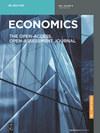小额信贷对农户收入的影响——以埃塞俄比亚奥罗米亚民族地区州贝尔区Sinana区为例
IF 0.8
4区 经济学
Q3 ECONOMICS
Economics-The Open Access Open-Assessment E-Journal
Pub Date : 2023-09-08
DOI:10.11648/j.eco.20231203.13
引用次数: 0
摘要
农村信贷是用来消除贫困的工具之一。信贷使小农能够在现金短缺时购买农业工具和投入物。因此,本研究的主要目的是调查获得信贷对家庭收入的影响。本研究采用了第一手资料和第二手资料。主要数据采用半结构化问卷收集。采用描述性、推断性和计量经济学技术进行数据分析。平均比较检验显示,获得信贷的小农的平均年收入总额比未获得信贷的小农每年多26 878.46埃塞俄比亚比尔。本文拟合了Heckman的两阶段计量经济模型。对获得信贷和家庭总收入的独立性进行了Wald卡方检验(rho = 0),结果表明,在1%的显著水平上,两个方程之间存在很强的关系。土地拥有量、合作社成员资格和户主受教育程度是影响信贷获取和家庭收入水平的共同潜在因素,在统计学上显著低于5%。因此,政府和非政府机构必须扩大信贷服务,解决埃塞俄比亚小农面临的信贷配给问题。本文章由计算机程序翻译,如有差异,请以英文原文为准。
The Effect of Micro-Credit on Rural Households’ Income in the Case of Sinana District, Bale Zone, Oromia National Regional State, Ethiopia
Rural credit is one of the tools used to combat poverty. Credit enables smallholder farmers to purchase agricultural tools and inputs when cash is scarce. Therefore, the main objective of this study was to investigate the effect of access to credit on household’s income. Both primary and secondary data were utilized in this study. Primary data was collected using semi-structured questionnaires. Descriptive, inferential, and econometric techniques were applied for data analysis. The mean comparison test revealed that on average the total annual income of smallholder farmers who received credit was better than non-beneficiaries by 26,878.46 Ethiopian Birr per annum. Heckman's two-stage econometric model was fitted. The Wald chi-square test of independency of access to credit and total household income per annum (rho = 0) was tested and showed that there is a strong relationship between the two equations at a 1% significance level. Landholdings, membership to cooperatives and education attainment of household head were among the common underlying factors which affect access to credit and the level of household income statistically significantly at less than 5% significance level. Therefore, government and non-governmental institutions must expand credit services and solve the problem of credit rationing facing smallholder farmers in Ethiopia.
求助全文
通过发布文献求助,成功后即可免费获取论文全文。
去求助
来源期刊

Economics-The Open Access Open-Assessment E-Journal
Economics, Econometrics and Finance-Economics, Econometrics and Finance (all)
CiteScore
3.20
自引率
0.00%
发文量
15
审稿时长
30 weeks
 求助内容:
求助内容: 应助结果提醒方式:
应助结果提醒方式:


